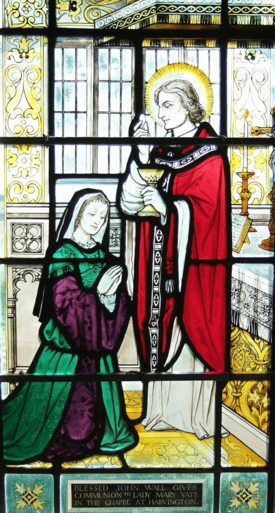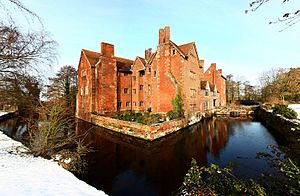John Wall (priest and martyr) facts for kids
Quick facts for kids SaintJohn Wall aka "Joachim of St. Ann" O.F.M. |
|
|---|---|

A stained glass window in Harvington Hall showing the martyr celebrating Mass in a secret room in that very hall.
|
|
| Martyr | |
| Born | c. 1620 Preston, Lancashire, England |
| Died | 22 August 1679 (aged 58 - 59) Worcester, England |
| Venerated in | Roman Catholic Church |
| Beatified | 15 December 1929 by Pope Pius XI |
| Canonized | 25 October 1970 by Pope Paul VI |
| Major shrine | Douai, France |
| Feast | 12 July (together with John Jones (martyr) 23 (formerly 22) August (Roman Catholic Archdiocese of Birmingham) 25 October (collectively with Forty Martyrs of England and Wales) 29 October (one of the Douai Martyrs) |
| Attributes | martyr's palm, crucifix, chalice, Eucharist, holding a rope or noose, book or bible, sometimes depicted in a Franciscan habit |
Saint John Wall (born around 1620 – died August 22, 1679) was an English Catholic Franciscan friar. He is honored as a martyr, which means he died for his religious beliefs.
He served as a priest in Worcestershire, England, for 22 years. He was arrested and put to death during a time when Catholics in England faced persecution. This happened because of a false story called Titus Oates's alleged plot.
Contents
Life of Saint John Wall
Early Life and Education
John Wall was born in Preston, Lancashire, England, around 1620. His family was wealthy and strongly Catholic. When he was very young, he was sent to the English College, Douai, a school in France for English Catholics.
Because the English government had spies looking for Catholics, John Wall used a different name, "John Marsh," to stay safe. His brother, William, also became a priest and a monk. William was arrested too but survived.
Becoming a Priest and Friar
John Wall continued his studies at the English College, Rome. He became a Catholic priest on December 3, 1645. After that, he was sent back to England in 1648. He used other names like Francis Johnson and Dormore to hide his true identity.
For several years, he secretly held Mass for Catholic families who refused to follow the official Church of England. In 1651, he joined the Order of Friars Minor (Franciscan friars) in Douai, France. He took the religious name Friar Joachim of St. Ann.
Ministry in England
After serving as a leader for new friars, he returned to England in 1656. He settled in Worcestershire and used the name Francis Webb. He often stayed at Harvington Hall, a house known for its secret hiding places called "priest-holes." These were built to hide priests from authorities.
John Wall worked as a priest for the Catholics in the area for 22 years. In December 1678, he was arrested. He was asked to take an oath saying the King was the head of the Church, but he refused because of his Catholic faith. For this, he was sent to Worcester Gaol (prison).
Trial and Execution
His trial took place on April 25, 1679. Someone he had once corrected for bad behavior testified that John Wall was a priest. Being a Catholic priest was against the law at that time, so he was sentenced to death.
He was then sent to London and questioned four times by people like Titus Oates. They hoped he would admit to being part of a plot against the King. However, John Wall was found innocent of any plotting. He was offered his freedom if he would give up his Catholic religion, but he refused.
John Wall was brought back to Worcester and executed on August 22, 1679, at Red Hill. Many people, even Protestants, were sad to see him die. The local sheriff reportedly said that such executions would only make more people become Catholic.
Veneration
After his death, John Wall's body was given to his friends. They buried him in the cemetery next to the Church of St. Oswald of Worcester. His head was taken to the Franciscan friary in Douai, France, where he had been a friar.
His feast day, which is a special day to remember him, is now celebrated on July 12. He shares this day with another Franciscan friar and martyr, St. John Jones. In the Roman Catholic Archdiocese of Birmingham, his feast day is celebrated on August 23. St John Wall Catholic School in Birmingham is named after him.
 | Bayard Rustin |
 | Jeannette Carter |
 | Jeremiah A. Brown |


